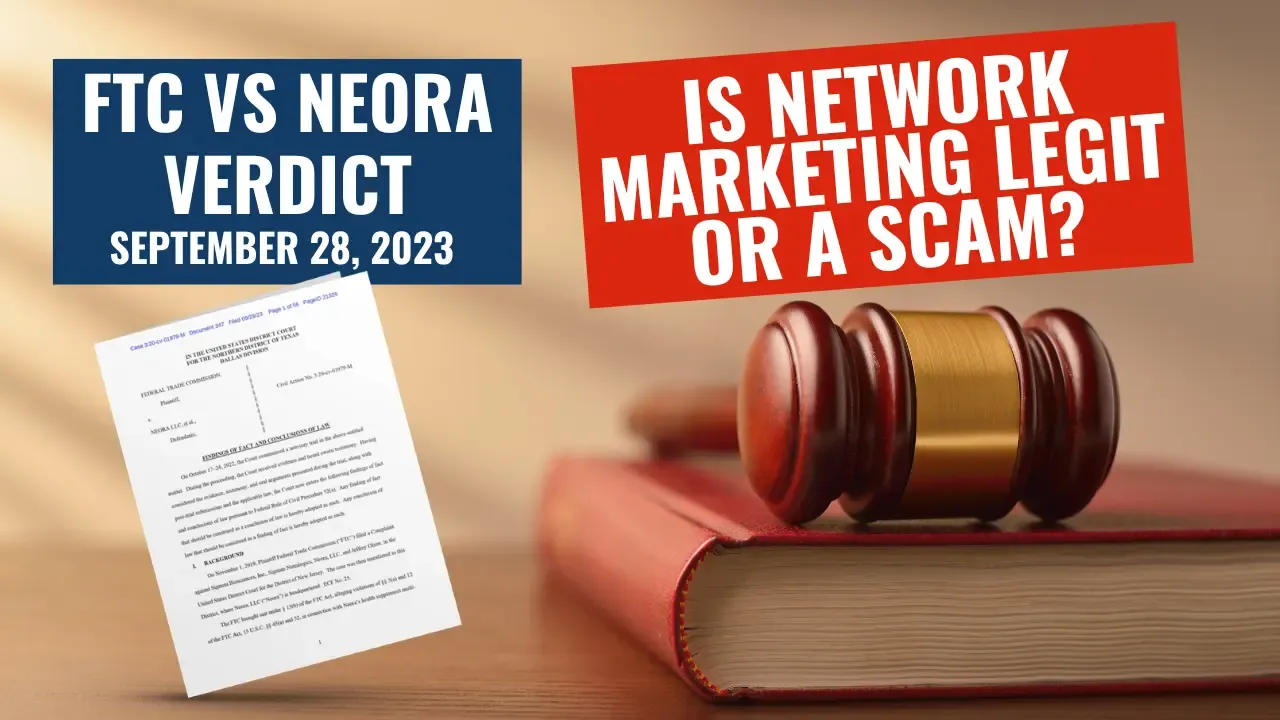Is Network Marketing a Legitimate Business or a Pyramid Scheme? | FTC vs Neora Case
Sep 30, 2023
Network marketing, also known as multi-level marketing (MLM), often gets a bad rap from the general public, aspiring entrepreneurs and government regulators.
Addressing Misconceptions: The Blurred Lines of Network Marketing
Many people confuse legitimate MLMs with pyramid schemes, leading to missed opportunities and unnecessary skepticism. Let's clear the air and delve into the complexities of network marketing, using the recent FTC vs Neora case ruling as the example.
FTC vs Neora Case: A Legal Milestone
In 2019, Neora proactively filed suit against the Federal Trade Commission (FTC) in court over allegations of operating an illegal pyramid scheme.
After nearly seven year battle with the FTC, as stated in the recent press release, this was a "David vs. Goliath" fight against the FTC, Neora, a leading science-based skincare and wellness company, celebrates a historic victory. On Thursday, Sep. 28, the judge overseeing the case, ruled that the FTC's claims were invalid, handing a monumental victory to Neora.
This case serves as a pivotal example of the legal intricacies involved in distinguishing pyramid schemes from legitimate MLMs.
Court's Findings and DSA Perspective: Two Sides of the Coin
The court's decision focused on Neora's business model, which involves selling beauty and wellness products through independent distributors. The Direct Selling Association stated that it sets a powerful precedent for protecting legitimate direct selling companies.
Government Guidelines: The Rulebook for MLMs
Both the Government of Canada and the FTC have guidelines that help differentiate between pyramid schemes and legitimate MLMs. The FTC warns MLMs against making exaggerated income and health claims, emphasizing that such claims can be misleading if most participants don't achieve the promised results.
Definitions and Distinguishing Factors: Know What You're Getting Into
- Pyramid Scheme: Focuses on recruiting members and promises payments for enrolling others, rather than selling products or services.
- Legitimate MLM: Involves selling a company's products or services directly to the end consumer. Income comes from one's own sales and the sales of recruits.
Red Flags: Don't Get Caught in the Trap
Watch out for these warning signs:
- Emphasis on recruiting over product sales
- High upfront costs
- Promises of quick riches
- No product or a hard-to-sell product
- Complex commission structure
Legitimacy and Longevity: The Test of Time
Legitimate MLM companies often have a long history in the market, attributed to the value and effectiveness of their products. This longevity is a good indicator of a company's legitimacy.
Tax Benefits and Obligations: The Financial Side of MLM
MLM offers potential tax benefits, especially during the start-up years. However, it's crucial to remember that income from MLM is considered legitimate and taxable. So, make sure to report your earnings accurately.
Understanding the difference between pyramid schemes and legitimate MLMs is crucial for anyone considering diving into network marketing. Stay informed, do your research, and always be cautious when considering new business opportunities.
Related Articles:
Say Goodbye to Tax Stress
Proven Tax Strategies, Audit-Proof Tools, and Year-Round Support for Home-Based Entrepreneurs




